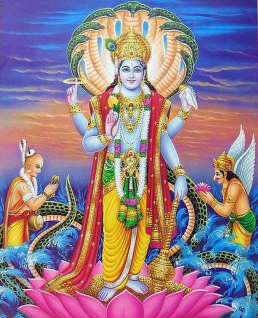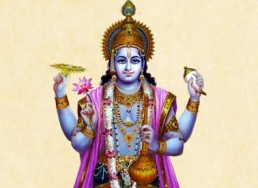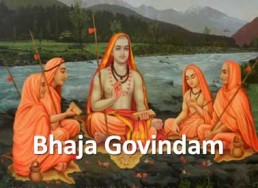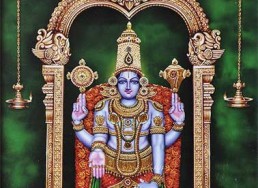Narayana Kavacham
Audio starts from the 4th verse below
ॐ श्रीगणेशाय नमः ।
ॐ नमो नारायणाय ।
अङ्गन्यासः –
ॐ ॐ नमः पादयोः ।
ॐ नं नमः जानुनोः ।
ॐ मों नमः ऊर्वोः ।
ॐ नां नमः उदरे ।
ॐ रां नमः हृदि ।
ॐ यं नमः उरसि ।
ॐ णां नमः मुखे ।
ॐ यं नमः शिरसि ॥
oṃ namo nārāyaṇāya .
aṅganyāsaḥ –
oṃ oṃ namaḥ pādayoḥ .
oṃ naṃ namaḥ jānunoḥ .
oṃ moṃ namaḥ ūrvoḥ .
oṃ nāṃ namaḥ udare .
oṃ rāṃ namaḥ hṛdi .
oṃ yaṃ namaḥ urasi .
oṃ ṇāṃ namaḥ mukhe .
oṃ yaṃ namaḥ śirasi ..
Salutations to Lord Nārāyaṇa (Vishnu).
Om Om Salutations to the feet.
Om Naṃ Salutations to the knees.
Om Moṃ Salutations to the thighs.
Om Nāṃ Salutations to the abdomen.
Om Rāṃ Salutations to the heart.
Om Yaṃ Salutations to the chest.
Om Ṇāṃ Salutations to the mouth.
Om Yaṃ Salutations to the head.
ॐ ॐ नमः दक्षिणतर्जन्याम् ।
ॐ नं नमः दक्षिणमध्यमायाम् ।
ॐ मों नमः दक्षिणानामिकायाम् ।
ॐ भं नमः दक्षिणकनिष्ठिकायाम् ।
ॐ गं नमः वामकनिष्ठिकायाम् ।
ॐ वं नमः वामानामिकायाम् ।
ॐ तें नमः वाममध्यमायाम् ।
ॐ वां नमः वामतर्जन्याम् ।
ॐ सुं नमः दक्षिणांगुष्ठोर्ध्वपर्वणि ।
ॐ दें नमः दक्षिणांगुष्ठाय पर्वणि ।
ॐ वां नमः वामांगुष्ठोर्ध्वपर्वणि ।
ॐ यं नमः वामांगुष्ठाय पर्वणि ॥
oṃ naṃ namaḥ dakṣiṇamadhyamāyām .
oṃ moṃ namaḥ dakṣiṇānāmikāyām .
oṃ bhaṃ namaḥ dakṣiṇakaniṣṭhikāyām .
oṃ gaṃ namaḥ vāmakaniṣṭhikāyām .
oṃ vaṃ namaḥ vāmānāmikāyām .
oṃ teṃ namaḥ vāmamadhyamāyām .
oṃ vāṃ namaḥ vāmatarjanyām .
oṃ suṃ namaḥ dakṣiṇāṃguṣṭhordhvaparvaṇi .
oṃ deṃ namaḥ dakṣiṇāṃguṣṭhāya parvaṇi .
oṃ vāṃ namaḥ vāmāṃguṣṭhordhvaparvaṇi .
oṃ yaṃ namaḥ vāmāṃguṣṭhāya parvaṇi ..
Om Naṃ Salutations to the right middle finger.
Om Moṃ Salutations to the right ring finger.
Om Bhaṃ Salutations to the right little finger.
Om Gaṃ Salutations to the left little finger.
Om Vaṃ Salutations to the left ring finger.
Om Teṃ Salutations to the left middle finger.
Om Vāṃ Salutations to the left thumb.
Om Suṃ Salutations to the upper joint of the right thumb.
Om Deṃ Salutations to the joint of the right thumb.
Om Vāṃ Salutations to the upper joint of the left thumb.
Om Yaṃ Salutations to the joint of the left thumb.
ॐ ॐ नमः हृदये ।
ॐ विं नमः मूर्धनि ।
ॐ षं नमः भ्रुवोर्मध्ये ।
ॐ णं नमः शिखायाम् ।
ॐ वें नमः नेत्रयोः ।
ॐ नं नमः सर्वसन्धिषु ।
ॐ मः अस्त्राय फट् प्राच्याम् ।
ॐ मः अस्त्राय फट् आग्नेयाम् ।
ॐ मः अस्त्राय फट् दक्षिणस्याम् ।
ॐ मः अस्त्राय फट् नैरृत्ये ।
ॐ मः अस्त्राय फट् प्रतीच्याम् ।
ॐ मः अस्त्राय फट् वायव्ये ।
ॐ मः अस्त्राय फट् उदीच्याम् ।
ॐ मः अस्त्राय फट् ऐशान्याम् ।
ॐ मः अस्त्राय फट् ऊर्ध्वायाम् ।
ॐ मः अस्त्राय फट् अधरायाम् ॥
oṃ viṃ namaḥ mūrdhani .
oṃ ṣaṃ namaḥ bhruvormadhye .
oṃ ṇaṃ namaḥ śikhāyām .
oṃ veṃ namaḥ netrayoḥ .
oṃ naṃ namaḥ sarvasandhiṣu .
oṃ maḥ astrāya phaṭ prācyām .
oṃ maḥ astrāya phaṭ āgneyām .
oṃ maḥ astrāya phaṭ dakṣiṇasyām .
oṃ maḥ astrāya phaṭ nairṛtye .
oṃ maḥ astrāya phaṭ pratīcyām .
oṃ maḥ astrāya phaṭ vāyavye .
oṃ maḥ astrāya phaṭ udīcyām .
oṃ maḥ astrāya phaṭ aiśānyām .
oṃ maḥ astrāya phaṭ ūrdhvāyām .
oṃ maḥ astrāya phaṭ adharāyām ..
Om Viṃ Salutations to the top of the head.
Om Ṣaṃ Salutations to the middle of the eyebrows.
Om Ṇaṃ Salutations to the tuft of hair.
Om Veṃ Salutations to the eyes.
Om Naṃ Salutations to all the joints.
Om Maḥ Astrāya Phaṭ to the east.
Om Maḥ Astrāya Phaṭ to the southeast.
Om Maḥ Astrāya Phaṭ to the south.
Om Maḥ Astrāya Phaṭ to the southwest.
Om Maḥ Astrāya Phaṭ to the west.
Om Maḥ Astrāya Phaṭ to the northwest.
Om Maḥ Astrāya Phaṭ to the north.
Om Maḥ Astrāya Phaṭ to the northeast.
Om Maḥ Astrāya Phaṭ upwards.
Om Maḥ Astrāya Phaṭ downwards.
अथ श्रीनारायणकवचम् ।
राजोवाच ।
यया गुप्तः सहस्राक्षः सवाहान्रिपुसैनिकान् ।
क्रीडन्निव विनिर्जित्य त्रिलोक्या बुभुजे श्रियम् ॥ १॥
rājovāca .
yayā guptaḥ sahasrākṣaḥ savāhānripusainikān .
krīḍanniva vinirjitya trilokyā bubhuje śriyam .. 1..
The king Parikshit said:
By which protection, the thousand-eyed Lord Vishnu defeated his enemies and enjoyed the wealth of the three worlds as if in play.
यथाऽऽततायिनः शत्रून् येन गुप्तोऽजयन्मृधे ॥ २॥
yathā”tatāyinaḥ śatrūn yena gupto’jayanmṛdhe .. 2..
By which, protected, the enemies of the one who is steadfast were defeated in battle.
वृतः पुरोहितस्त्वाष्ट्रो महेन्द्रायानुपृच्छते ।
नारायणाख्यं वर्माह तदिहैकमनाः शृणु ॥ ३॥
vṛtaḥ purohitastvāṣṭro mahendrāyānupṛcchate .
nārāyaṇākhyaṃ varmāha tadihaikamanāḥ śṛṇu .. 3..
विश्वरूप उवाच ।
धौताङ्घ्रिपाणिराचम्य सपवित्र उदङ्मुखः ।
कृतस्वाङ्गकरन्यासो मन्त्राभ्यां वाग्यतः शुचिः ॥ ४॥
नारायणमयं वर्म सन्नह्येद्भय आगते ।
पादयोर्जानुनोरूर्वोरुदरे हृद्यथोरसि ॥ ५॥
मुखे शिरस्यानुपूर्व्यादोङ्कारादीनि विन्यसेत् ।
ॐ नमो नारायणायेति विपर्ययमथापि वा ॥ ६॥
viśvarūpa uvāca .
dhautāṅghripāṇirācamya sapavitra udaṅmukhaḥ .
kṛtasvāṅgakaranyāso mantrābhyāṃ vāgyataḥ śuciḥ .. 4..
nārāyaṇamayaṃ varma sannahyedbhaya āgate .
pādayorjānunorūrvorudare hṛdyathorasi .. 5..
mukhe śirasyānupūrvyād oṅkārādīni vinyaset .
oṃ namo nārāyaṇāyeti viparyayamathāpi vā .. 6..
प्रणवादियकारान्तमङ्गुल्यङ्गुष्ठ पर्वसु ॥ ७॥
Praṇavādiyakārāntam aṅgulyaṅguṣṭha parvasu .. 7..
न्यसेद्धृदय ओङ्कारं विकारमनु मूर्धनि ।
षकारं तु भ्रुवोर्मध्ये णकारं शिखया दिशेत् ॥ ८॥
वेकारं नेत्रयोर्युञ्ज्यान्नकारं सर्वसन्धिषु ।
मकारमस्त्रमुद्दिश्य मन्त्रमूर्तिर्भवेद्बुधः ॥ ९॥
सविसर्गं फडन्तं तत् सर्वदिक्षु विनिर्दिशेत् ।
ॐ विष्णवे नम इति ॥ १०॥
nyaseddhṛdaya oṅkāraṃ vikāramanu mūrdhani .
ṣakāraṃ tu bhruvormadhye ṇakāraṃ śikhayā diśet .. 8..
vekāraṃ netrayoryuñjyānnakāraṃ sarvasandhiṣu .
makāramastramuddiśya mantramūrtirbhavedbudhaḥ .. 9..
savisargaṃ phaḍantaṃ tat sarvadikṣu vinirdiśet .
oṃ viṣṇave nama iti .. 10..
विद्यातेजस्तपोमूर्तिमिमं मन्त्रमुदाहरेत् ॥ ११॥
vidyātejastapomūrtimimaṃ mantramudāharet .. 11..
NARAYANA KAVACHAM
ॐ हरिर्विदध्यान्मम सर्वरक्षां
न्यस्ताङ्घ्रिपद्मः पतगेन्द्रपृष्ठे ।
दरारिचर्मासिगदेषुचाप-
पाशान्दधानोऽष्टगुणोऽष्टबाहुः ॥ १२॥
nyastāṅghripadmaḥ patagendrapṛṣṭhe .
darāricarmāsigadeṣucāpa-
pāśāndadhāno’ṣṭaguṇo’ṣṭabāhuḥ .. 12..
र्यादोगणेभ्यो वरुणस्य पाशात् ।
स्थलेषु मायावटुवामनोऽव्यात्
त्रिविक्रमः खेऽवतु विश्वरूपः ॥ १३॥
ryādogaṇebhyo varuṇasya pāśāt .
sthaleṣu māyāvaṭuvāmano’vyāt
trivikramaḥ khe’vatu viśvarūpaḥ .. 13..
पायान्नृसिंहोऽसुरयूथपारिः ।
विमुञ्चतो यस्य महाट्टहासं
दिशो विनेदुर्न्यपतंश्च गर्भाः ॥ १४॥
pāyānnṛsiṃho’surayūthapāriḥ .
vimuñcato yasya mahāṭṭahāsaṃ
diśo vinedurnyapataṃśca garbhāḥ .. 14..
स्वदंष्ट्रयोन्नीतधरो वराहः ।
रामोऽद्रिकूटेष्वथ विप्रवासे
सलक्ष्मणोऽव्याद्भरताग्रजोऽस्मान् ॥ १५॥
svadaṃṣṭrayonnītadharo varāhaḥ .
rāmo’drikūṭeṣvatha vipravāse
salakṣmaṇo’vyādbharatāgrajo’smān .. 15..
न्नारायणः पातु नरश्च हासात् ।
दत्तस्त्वयोगादथ योगनाथः
पायाद्गुणेशः कपिलः कर्मबन्धात् ॥ १६॥
nnārāyaṇaḥ pātu naraśca hāsāt .
dattastvayogādatha yoganāthaḥ
pāyādguṇeśaḥ kapilaḥ karmabandhāt .. 16..
द्धयशीर्षा मां पथि देवहेलनात् ।
देवर्षिवर्यः पुरुषार्चनान्तरात्
कूर्मो हरिर्मां निरयादशेषात् ॥ १७॥
ddhayaśīrṣā māṃ pathi devahelanāt .
devarṣivaryaḥ puruṣārcanāntarāt
kūrmo harirmāṃ nirayādaśeṣāt .. 17..
द्द्वन्द्वाद्भयादृषभो निर्जितात्मा ।
यज्ञश्च लोकादवताञ्ज्जनान्ता-
द्बलो गणात्क्रोधवशादहीन्द्रः ॥ १८॥
ddvandvādbhayādṛṣabho nirjitātmā .
yajñaśca lokādavatāñjjanāntā-
dbalo gaṇātkrodhavaśādahīndraḥ .. 18..
द्बुद्धस्तु पाखण्डगणप्रमादात् ।
कल्किः कलेः कालमलात्प्रपातु
धर्मावनायोरुकृतावतारः ॥ १९॥
dbuddhastu pākhaṇḍagaṇapramādāt .
kalkiḥ kaleḥ kālamalātprapātu
dharmāvanāyorukṛtāvatāraḥ .. 19..
द्गोविन्द आसङ्गवमात्तवेणुः ।
नारायणः प्राह्ण उदात्तशक्ति-
र्मध्यन्दिने विष्णुररीन्द्रपाणिः ॥ २०॥
dgovinda āsaṅgavamāttaveṇuḥ .
nārāyaṇaḥ prāhṇa udāttaśakti-
rmadhyandine viṣṇurarīndrapāṇiḥ .. 20..
सायं त्रिधामावतु माधवो माम् ।
दोषे हृषीकेश उतार्धरात्रे
निशीथ एकोऽवतु पद्मनाभः ॥ २१॥
sāyaṃ tridhāmāvatu mādhavo mām .
doṣe hṛṣīkeśa utārdharātre
niśītha eko’vatu padmanābhaḥ .. 21..
प्रत्यूष ईशोऽसिधरो जनार्दनः ।
दामोदरोऽव्यादनुसन्ध्यं प्रभाते
विश्वेश्वरो भगवान् कालमूर्तिः ॥ २२॥
pratyūṣa īśo’sidharo janārdanaḥ .
dāmodaro’vyādanusandhyaṃ prabhāte
viśveśvaro bhagavān kālamūrtiḥ .. 22..
भ्रमत्समन्ताद्भगवत्प्रयुक्तम् ।
दन्दग्धि दन्दग्ध्यरिसैन्यमाशु
कक्षं यथा वातसखो हुताशः ॥ २३॥
bhramatsamantādbhagavatprayuktam .
dandagdhi dandagdhyarisainyamāśu
kakṣaṃ yathā vātasakho hutāśaḥ .. 23..
निष्पिण्ढि निष्पिण्ढ्यजितप्रियासि ।
कूष्माण्डवैनायकयक्षरक्षो-
भूतग्रहांश्चूर्णय चूर्णयारीन् ॥ २४॥
niṣpiṇḍhi niṣpiṇḍhyajitapriyāsi .
kūṣmāṇḍavaināyakayakṣarakṣo-
bhūtagrahāṃścūrṇaya cūrṇayārīn .. 24..
पिशाचविप्रग्रहघोरदृष्टीन् ।
दरेन्द्र विद्रावय कृष्णपूरितो
भीमस्वनोऽरेर्हृदयानि कम्पयन् ॥ २५॥
piśāca vipragrahaghoradṛṣṭīn .
darendra vidrāvaya kṛṣṇapūrito
bhīmasvano’rerhṛdayāni kampayan .. 25..
मीशप्रयुक्तो मम छिन्धि छिन्धि ।
चक्षूंषि चर्मञ्छतचन्द्र छादय
द्विषामघोनां हर पापचक्षुषाम् ॥ २६॥
mīśaprayukto mama chindhi chindhi .
cakṣūṃṣi carmañchatacandra chādaya
dviṣāmaghonāṃ hara pāpacakṣuṣām .. 26..
यन्नो भयं ग्रहेभ्योऽभूत्केतुभ्यो नृभ्य एव च ।
सरीसृपेभ्यो दंष्ट्रिभ्यो भूतेभ्योंऽहोभ्य एव च ॥ २७॥
सर्वाण्येतानि भगवन्नामरूपास्त्रकीर्तनात् ।
प्रयान्तु सङ्क्षयं सद्यो ये नः श्रेयःप्रतीपकाः ॥ २८॥
yanno bhayaṃ grahebhyo’bhūtketubhyo nṛbhya eva ca .
sarīsṛpebhyo daṃṣṭribhyo bhūtebhyoṃ’hobhya eva ca .. 27..
sarvāṇyetāni bhagavannāmarūpāstrakīrtanāt .
prayāntu saṅkṣayaṃ sadyo ye naḥ śreyaḥpratīpakāḥ .. 28..
रक्षत्वशेषकृच्छ्रेभ्यो विष्वक्सेनः स्वनामभिः ॥ २९ ॥
rakṣatvaśeṣakṛcchrebhyo viṣvaksenaḥ svanāmabhiḥ .. 29 ..
बुद्धीन्द्रियमनःप्राणान्पान्तु पार्षदभूषणाः ॥ ३०॥
buddhīndriyamanaḥprāṇānpāntu pārṣadabhūṣaṇāḥ .. 30..
सत्येनानेन नः सर्वे यान्तु नाशमुपद्रवाः ॥ ३१॥
satyenānena naḥ sarve yāntu nāśamupadravāḥ .. 31..
यथैकात्म्यानुभावानां विकल्परहितः स्वयम् ।
भूषणायुधलिङ्गाख्या धत्ते शक्तीः स्वमायया ॥ ३२॥
तेनैव सत्यमानेन सर्वज्ञो भगवान् हरिः ।
पातु सर्वैः स्वरूपैर्नः सदा सर्वत्र सर्वगः ॥ ३३॥
yathaikātmyānubhāvānāṃ vikalparahitaḥ svayam .
bhūṣaṇāyudhaliṅgākhyā dhatte śaktīḥ svamāyayā .. 32..
tenaiva satyamānena sarvajño bhagavān hariḥ .
pātu sarvaiḥ svarūpairnaḥ sadā sarvatra sarvagaḥ .. 33..
दन्तर्बहिर्भगवान्नारसिंहः ।
प्रहापयँलोकभयं स्वनेन
स्वतेजसा ग्रस्तसमस्ततेजाः ॥ ३४॥
dantarbahirbhagavānnārasiṃhaḥ .
prahāpayam̐lokabhayaṃ svanena
svatejasā grastasamastatejāḥ .. 34..
विजेष्यस्यञ्जसा येन दंशितोऽसुरयूथपान् ॥ ३५॥
vijeṣyasyañjasā yena daṃśito’surayūthapān .. 35..
पदा वा संस्पृशेत्सद्यः साध्वसात्स विमुच्यते ॥ ३६॥
padā vā saṃspṛśetsadyaḥ sādhvasātsa vimucyate .. 36..
राजदस्युग्रहादिभ्यो व्याघ्रादिभ्यश्च कर्हिचित् ॥ ३७॥
rājadasyugrahādibhyo vyāghrādibhyaśca karhicit .. 37..
योगधारणया स्वाङ्गं जहौ स मरुधन्वनि ॥ ३८॥
yogadhāraṇayā svāṅgaṃ jahau sa marudhanvani .. 38..
ययौ चित्ररथः स्त्रीभिर्वृतो यत्र द्विजक्षयः ॥ ३९ ॥
yayau citrarathaḥ strībhirvṛto yatra dvijakṣayaḥ .. 39 ..
स वालखिल्यवचनादस्थीन्यादाय विस्मितः ।
प्रास्य प्राचीसरस्वत्यां स्नात्वा धाम स्वमन्वगात् ॥ ४०॥
sa vālakhilyavacanādasthīnyādāya vismitaḥ .
prāsya prācīsarasvatyāṃ snātvā dhāma svamanvagāt .. 40..
य इदं शृणुयात्काले यो धारयति चादृतः ।
तं नमस्यन्ति भूतानि मुच्यते सर्वतो भयात् ॥ ४१॥
ya idaṃ śṛṇuyātkāle yo dhārayati cādṛtaḥ .
taṃ namasyanti bhūtāni mucyate sarvato bhayāt .. 41..
त्रैलोक्यलक्ष्मीं बुभुजे विनिर्जित्य मृधेऽसुरान् ॥ ४२॥
trailokyalakṣmīṃ bubhuje vinirjitya mṛdhe’surān .. 42..
षष्ठस्कन्धे नारायणवर्म कथनं नामाष्टमोऽध्यायः ॥
ṣaṣṭhaskandhe nārāyaṇavarma kathanaṃ nāmāṣṭamo’dhyāyaḥ ..
In the sixth book, the eighth chapter is named “The Story of Narayana’s Armor.”

Description
Overview
- Name: Narayana Kavacham (Narayana’s Armor)
- Source: Śrīmad Bhāgavata Mahāpurāṇa, specifically in the sixth book (skandha), eighth chapter (adhyāya).
- Deity: Lord Vishnu (Narayana)
- Purpose: To provide divine protection, blessings, and empowerment to the devotee.
Content and Structure
- Introduction
- The Kavacham begins with a dialogue where the king (often King Yudhishthira in various texts) inquires about the divine armor that can protect one from all adversities and enemies.
- Protection Against Enemies
- It describes how the divine armor (Kavacham) can protect the devotee in battles and conflicts. The armor is said to be highly effective in safeguarding against physical, mental, and spiritual threats.
- Mantras and Rituals
- The Kavacham consists of a series of mantras that are chanted or meditated upon to invoke the protective blessings of Lord Vishnu. These mantras are recited to place divine energy and protection on various parts of the body.
- Detailed Invocation
- Aṅganyāsa (Placing Mantras on Limbs): Mantras are placed on different parts of the body, such as the feet, knees, thighs, abdomen, heart, chest, mouth, and head.
- Karaṇyāsa (Placing Mantras on Hands): Specific mantras are also placed on the fingers and joints of the hands.
- Directional Protection
- The Kavacham includes mantras for protection in all directions—east, west, north, south, as well as in intermediate directions like northeast and southwest. This ensures comprehensive protection.
- Divine Attributes
- Each mantra in the Kavacham is associated with different attributes of Lord Vishnu, reflecting his divine powers and qualities. The purpose is to align the devotee’s energy with these divine attributes.
- Conclusion
- The Kavacham often concludes with a prayer or affirmation, reinforcing the devotee’s faith and seeking Lord Vishnu’s continued protection and blessings.
Significance
- Protection: It is believed to provide a shield against various forms of harm and misfortune.
- Empowerment: Helps in gaining strength, courage, and spiritual resilience.
- Spiritual Connection: Enhances the devotee’s connection with Lord Vishnu and fosters deeper devotion.
- Ritual Use: Widely used in religious rituals and personal worship as a means of seeking divine protection and blessings.
The Narayana Kavacham is considered a powerful and essential text for those seeking the divine protection and grace of Lord Vishnu. It reflects the deep spiritual tradition of invoking divine energy for comprehensive safeguarding and empowerment.
Other Vishnu Shlokams
Acyutam Kesavam
Everybody should meditate regularly upon Achyuta, Kesava, Vishnu, Hari, Satya, Janardhana and Narayana, the swan, which signifies the quintessence of things.
Akasat Patitam Toyam
As all rains falling from the sky reach the ocean; so also the prayers to all gods ultimately get to the Lord Keshava.
Apavitra Pavitro
Om, if one is Apavitra (Impure) or Pavitra (Pure), or even in all other conditions, he who remembers Pundarikaksha (another name of Sri Vishnu, literally meaning with lotus-like eyes), he becomes pure
Bhaja Govindam
Shlokams,Vishnu,Sankara,Govinda,Krishna,Prakarana Grantha
Bhaja Govindam is one of the most popular hymns penned by Adi Shankaracharya. He has packed into the Bhaja Govindam song the substance of all Vedanta, and set the oneness of Jnana and Bhakti to melodious music.
Dhanvantari Mantra
The Dhanvantari Mantra calls upon the divine healer, Lord Dhanvantari, the god of Ayurveda, for health and protection from ailments.
Kayena Vaca
Whatever I do either by body, speech, mind or sensory organs, either with my personal knowledge or natural trait, I surrender and submit all to that to supreme divine Narayana.
Lakshmi Narasimha Karavalambam
Narasimha is a fierce avatar of the Hindu god Vishnu, one who incarnates in the form of part lion and part man to destroy evil and end religious persecution and calamity on Earth, thereby restoring Dh
Mantra Pushpam
The Mantra Pushpam (literally translating to "Flower of Mantras") is a collection of sacred verses from the 10th chapter of Taittiriya Aranyaka of Krishna Yajur Veda. Each verse begins with an exploration of the relationship between the flower of…
Megha Syamam
Salutations to Sri Vishnu who is beautiful like the dark clouds, and who is wearing yellow garments of silk; Who has the mark of Srivatsa on his chest; and whose body is shining with the radiance of t
Namami Narayana Pada
I salute the lotus-feet of Narayana, always, propitiate Narayana, speak of the pure name of Narayana and bear in mind the immutable factuality of Narayana.
Narayanam Hrishikesam
I salute Narayana, Hrishikesa, Govinda, Garudadhwaja, Vaasudeva, Hari, Krishna and Kesava.
Narayaneti Vagvalvi
The four letters 'Na', 'Ra,'Ya', 'Na' are the four shoots on the creeper of speech and are undoubtedly indicative of the four Purusharthas- Dharma, Artha, Kaama and Moksha.
Ranganatha Ashtakam
Ranganatha Ashtakam was written by Adi Sankara Bhagavatpada when he stood before Sri Ranganatha swamy in Srirangam, during his travels. This Ashtakam reveals that Adi Sankara was overwhelmed by Lord R
Sashanka Chakram Sakirita
I salute, prostrate with my head, to that four-armed Lord Vishnu, who is ornamented with the shankh (conch) and chakra (the divine wheel), the crown and ear-drops, yellow silk robes, lotus-eyes, decor
Shantakaram
We bow to the only lord of all worlds, Vishnu who is of peaceful appearance, reclining on the serpent, with a lotus from the navel, lord of gods, the basis of the universe, vast like the sky, coloured
Somanatha Vaidyanatha
One who remembers Somanātha (Lord Śiva), Vaidyanātha (the healer Śiva), Dhanvantari (the divine physician), and the twin Ashvinis (divine doctors of the gods) every morning will not be touched by dise
Swayam Vyakta Sthalam
First, called "Ranga", the great temple (of Srirangam), made known by the (great lord) Ranga, (Then) Srimushanam and Venkatadri, Salagrama and Naimisha, Toyadri (Thiruneermalai), Pushkara and indeed N
Venkatesa Suprabhatam
This shlokam is taken from Sri Valmiki's Srimadh Ramayanam. During the journey with Sage Viswamitra, both Rama and Lakshmana had rested for the night on the banks of the Ganga river. As the dawn was
Vishnu Sahasranamam
The Vishnu Sahasranam is found in the Mahabharatha. Literally translated this means thousand names of Vishnu. This is found in the Anushasanika Parvam (chapter relating to orders or rules to the kings) of Mahabharatha. Though it describes one…
Vishnu Shatanama Stotram
The Vishnu Shatanama Stotram is a revered hymn that encapsulates the divine attributes and various forms of Lord Vishnu, serving as a powerful invocation for devotees seeking spiritual elevation and liberation. The stotra, composed by Sri Veda…
Vishnu Shatpadi Stotram
The Sri Vishnu Shatpadi is a revered Sanskrit stotra (hymn) dedicated to Lord Vishnu, the preserver and protector in Hinduism. Composed by the illustrious philosopher and saint, Sri Shankaracharya, this hymn comprises six verses (ṣaṭpadī) that…
Narayana Kavacham – Vishnu – In Sanskrit, English Translation, Meaning, Significance and Audio.



